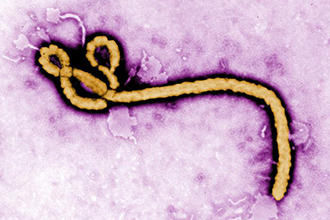Facts about the Ebola crisis

Pictured above is a colorized image of an Ebola virus virion from Centers for Disease Control microbiologist Frederick A. Murphy.
Fact-checking site Politifact stepped in this week to refute false allegations in the blogosphere connecting the outbreak to Bill and Melinda Gates, George Soros and even Tulane University. New Wave, the online daily news of Tulane University, separates fact from myth regarding Ebola and continued efforts by Tulane University to combat this tragic outbreak.
MYTH: Ebola virus is airborne like the flu.
FACT: While extremely contagious, people must have contact with bodily fluids of someone who is visibly sick with the virus to catch it.
MYTH: The disease is a government conspiracy and healthcare workers are infecting patients.
FACT: Ebola virus is present in several rain forest animals including bats and primates. People coming in contact with the animals can be infected with the virus and spread it to others. The current outbreak began in Guinea and then spread by human-to-human contact to Liberia, Sierra Leone and Nigeria. Healthcare workers are not infecting patients, but can become infected themselves while caring for Ebola patients. About 10 percent of the deaths in the West African outbreak are among healthcare workers.
MYTH: Tulane is leaving Sierra Leone at the behest of the Ministry of Health.
FACT: Tulane has worked in Sierra Leone on a related disease called Lassa fever for more than a decade. Several Tulane faculty, staff members and physicians are currently in Sierra Leone working closely with the Ministry of Health and the World Health Organization to respond to the Ebola outbreak.
MYTH: Tulane is collaborating with the military in bioweapons research in West Africa.
FACT: Tulane is working with Harvard University and others in the Viral Hemorrhagic Fever Consortium to develop diagnostics, vaccines and therapeutics for Lassa fever and Ebola. Support for the consortium has come principally from the National Institutes of Health. Tulane is not receiving any support for its work in Sierra Leone from the military.
